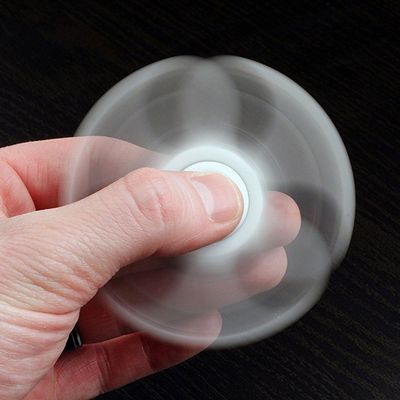
You know those fidget-spinner toys kids are obsessed with? I didn’t until recently, because I don’t have any kids. But apparently these toys, which are basically what they sound like — you can use them to release fidget-energy by spinning them on your fingers — have swept the nation’s schools, making for a Tamagotchi-esque craze (if you have to look that reference up it is unlikely you are old enough to have a kid in a school that has been invaded by fidget spinners). Now, some are saying the toys are too distracting and have no place in the classroom.
But wait! There’s also some evidence they’re genuinely helpful for kids with ADHD or other, similar conditions, notes an article in the Washington Post by Erin Silver. Not that that has stopped some schools from giving them the boot: “They are so popular that some teachers have banned them in the classroom,” notes Silver. “Some schools in Manchester, England, made headlines recently when they announced a fidget-toy ban via text message, enraging parents of special-needs students in the process.”
Silver’s argument lays out the controversy nicely, and part of what’s interesting is that this is one of those debates that’s ostensibly about a specific thing, but that is really about a whole lot of other stuff. I’ll let Claire Heffron, a pediatric occupational therapist in Cleveland quoted by Silver, explain:
Heffron says there need to be rules about when and how fidgets can be used if they are to be part of an effective learning strategy, rather than a distraction. Fidgets should also be part of a much larger discussion, she says, about managing behavior in classrooms and what the school day looks like for children.
“Kids spend a lot of time sitting in class, and recesses are shorter than ever at 15 or 20 minutes. Developmentally this doesn’t even come close to the amount of movement kids need in a day,” says Heffron, co-author of the child-development blog The Inspired Treehouse and author of the book “Sensory Processing 101.”
Heffron says students also are feeling increased pressure over standardized testing, which, combined with the decreased movement, results in an overflow of problem behavior in school. “We need to come up with strategies to meet it,” she says. “Fidget tools are a profound piece of the discussion, but they are just the tip of the iceberg.”
So the fact that people have such passionate feelings about the spinner toys is partially because parents whose kids genuinely need them don’t want them taken away, parents whose kids are distracted do want them taken away, and so on. But it’s also a reflection of all this other stuff going on in the education system, burbling below the surface — the fact that lots of kids are overworked and overtested and forced to sit still for large spans of time in a way that is fairly unnatural to young humans. Whether or not a bunch of kids are still finger-spinner-ing their way through 8:45 precalc a year from now, those other issues will still be there.




